
|
March 8, 2006:A moment with...
(Photo by Frank Wojciechowski) |
Fernando Montero ’06
Fernando Montero ’06, a history major from Costa Rica, was one of several students who organized a forum last month about whether Princeton has become too close to government, as evidenced by the visits of guest speakers to campus (see Notebook, page 12). The forum was triggered by the celebration last fall of the Woodrow Wilson School’s 75th anniversary, an event that included major addresses by Secretary of State Condoleezza Rice and other government figures. Many students and faculty members took special issue with the statement by WWS Dean Anne-Marie Slaughter ’80 at the celebration that Rice exemplified Princeton’s values. Slaughter has said that she “clearly did not mean we endorsed her policies,” but was referring to Rice’s distinguished career in academia and her willingness to put her talents and values to work in public service. Montero spoke with PAW editor Marilyn Marks *86.
What were the students hoping this forum would accomplish?
One of the things that we were trying to express was the political diversity of this campus. Many of us are international students, and we have thought that there is at this University a kind of superficial view of diversity. Each year there is an international festival to celebrate the diversity of the school. It’s a very large event organized by the international student organization; students dress in traditional dress, and it’s fun. But our cultural diversity is deeply rooted in serious political questions, questions that are repeatedly neglected or brushed aside. For example, how can you not address something that all international students are being exposed to these days, like being at the airport, where every time we have to produce fingerprints and get our photo taken? These are things they used to do to criminals. The political diversity on campus — this is something that tends to get silenced.
At the forum, we were trying to express a line of argument that is usually excluded at the high-profile events of the University. We wanted to express what we felt about direct actions taken by University officials — [Slaughter] saying that a specific public official exemplifies the University’s values, especially if [University officials] claim they can separate between public service and the way in which that person serves. That separation, I think, is impossible.
Do you think it was inappropriate for Rice to come to Princeton?
I certainly don’t oppose the reception of government officials. I oppose the reception of government officials who refuse to recognize that while we have something to learn from them, they have something to learn from us. There are reasons to recognize other voices. Student voices. International voices. Voices that are opposed to the way you are advocating and producing violence. [Slaughter has noted that Rice took a few questions from audience members and also had an off-the-record discussion with a group of students.]
Should Princeton invite speakers who won’t take questions?
I think that the University should insist that public officials be subject to critical dialogue. If [speakers] refuse to recognize different speakers and different cultures, then they should not be invited. Because that is a dangerously arrogant attitude. As an expression of political diversity, yes, they should be required to interact with students. I mean a very heterogenous group of students from different countries, different classes, and who think very differently politically.
Are students exposed to a wide range of viewpoints in and out of the classroom? Dean Slaughter noted that last year’s major WWS event featured Hanan Ashrawi, the Palestinian activist and legislator, and other programs regularly host critical speakers.
There is a wide range of viewpoints. But that is not the only issue. The University is failing to represent the voices of those whom foreign and domestic policy most affects. That is something that definitely does not happen at the high-profile events. There are some parts of the University that are — perhaps not conservative, but exclusive. There are other parts of the University that are inclusive, that try to represent the voices of, let’s say, immigrants, who are also being affected by the Patriot Act. There should be more of that.
Is Princeton too close to power?
Today, I think it is little more than a helpful accomplice.
So what do you propose?
Ensure that [the statements of] government officials, and official policy, are submitted to critical thought every time they are debated. And public officials should be required to engage in critical dialogue.
If Princeton says, “we will refuse monologue and accept only dialogue,”
we can work with other universities to do that, too. Establish an alliance.
One of the roles of the university is to mediate between intellectuals
and public debate. That would be one very good way of intervening in the
debate. ![]()

